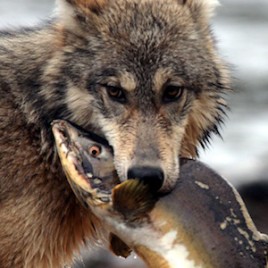
Although wolves in BC can easily swim across the waterways that separate BC’s coastal islands from the mainland, both traditional first nations knowledge and scientific studies indicate that the populations on both sides rarely interbreed, and that the coastal wolves live a different lifestyle that includes consumption of more fish. (Photo credit: Chris Darimont)
New genetic information affirms what members of the Heiltsuk First Nation have long known: the islands off British Columbia host a population of ‘coastal wolves’ that is distinct but related to that of the timber wolves on the mainland.
Examination of genetic markers from DNA collected in wolf droppings shows that coastal wolves are more likely to be related to each other than to mainland wolves, despite the fact that the waterways between the two are easily crossed. Previous research has shown that coastal wolves have a different diet than their mainland cousins – for example, they consume up to 90 per cent sea food – and that the prevalence of certain parasites is also different between the two groups.
Original research paper published in the journal BCM Ecology on June 9, 2014.
Names and affiliations of selected authors



